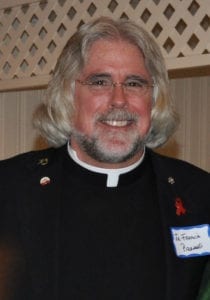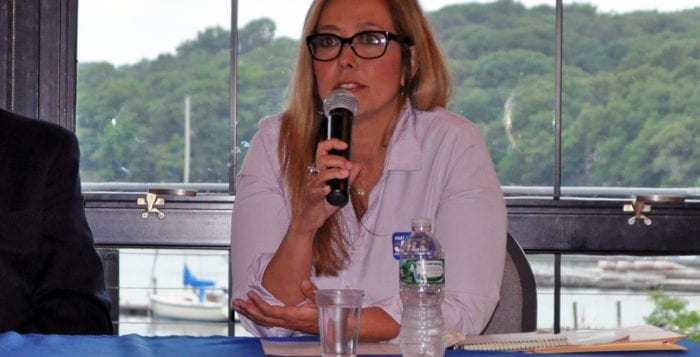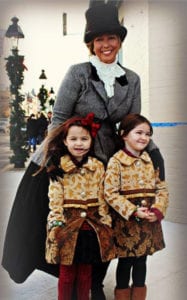By Daniel Dunaief

My Aunt Maxine had Down syndrome, which means she was mentally disabled.
In so many ways, Maxine and her life defied expectations and labels.
When Maxine was born, doctors told my grandparents that she wouldn’t likely live long, so they should consider putting her in an institution.
My grandparents couldn’t imagine being away from their daughter. They took Maxine home to the Upper East Side of Manhattan, where they raised and educated her.
As she grew up, Maxine was on the shorter side, at under five feet tall, and carried the youthful, round face of Down syndrome throughout her life.
She also had facial hair that my grandmother, mother and caregivers regularly trimmed.
My aunt lacked any self-consciousness about who she was, what she was, and how she related to the world. She figured everyone was as ready to love her and interact with her as she was with them.
More often than not, she smiled, offering an energetic and enthusiastic nod whenever anyone made eye contact. Plenty of people avoided looking at her in part because she was different and, in part, because she lived in New York and the rules of sidewalk engagement limited eye contact.
When people didn’t notice or engage with her, she kept walking, singing, talking to herself, chatting with her parents or the rest of us, or whistling, which she could do by inhaling and exhaling.
She lived at a higher decibel level. Her whisper was even louder than her normal speaking voice.
“What?” she’d whisper so loudly that it could be heard in the back row of a movie theater. “You want me to be quiet? Is that what you’re telling me?”
“Yes, shhhh.”
“Don’t shush me!” she’d say, her husky whisper, like her husky voice, becoming louder and indignant.
“Sorry, Macky,” I’d say. “People are trying to watch the movie. Can you watch it, too?”
“Oh, yes, yes, yes,” she’d say, nodding vigorously. “I’ll be quiet. I will. I’ll be quiet. If that’s what you want, I can be quiet. Sure, suuuuure!”
She was spectacularly funny and knew introductions were an opportunity for comedy.
“Who is this young lady?” she’d ask anyone who walked in the door in our house. The person could be anywhere from six to 96 and she’d ask the same thing.
“How old are you?” she’d ask.
No matter the answer, she’d suggest the person was a “lovely” young lady.
“What’s your name?” she’d ask.
When the person said her name, she’d say “what” several times and then ask the person to spell it. When she slowed our guest down repeatedly and asked her to say it again, the guest would shout.
“Hey, what are you yelling for? I can hear you. Not so loud. You’re hurting my ears.”
She’d squint and a smile would fill her face as she’d scan the room, knowing the old routine had hit the mark.
More than anything else, though, Maxine was compassionate, emotionally connected, loving and supportive.
She would sing the Star Spangled Banner when she listened to Robert Merrill on the radio before a Yankees game.
“It’s so beautiful,” she’d say, as she blew her nose and wiped her eyes.
I suspect many other Americans have an aunt, sibling, distant relative, friend or neighbor for whom labels mean even less than the totality of their lives, the winsome nature of their personality, and the triumphs that define their days.
Hearing anyone use the term “disabled” as a take down misses the point, particularly for those who seek to be the country’s leader.
Maxine required but also taught a level of patience. In exchange, our family and friends appreciated her joy of life and basked in her unconditioned positive regard. She wouldn’t have resented or hated others, wouldn’t have insulted individuals or a group and would have forgiven anyone who made a mistake.
Perhaps some day, those who use words like “mental disability” as a way to dismiss others or to cast others aside will think of the Maxines of the world. We can learn so much from others whose lives are different from ours and who aren’t trying to use words to project an image, to cut others down, or to suggest that someone is limited.
I can picture Maxine sitting in a chair next to me, tilting her head and looking at me from the side.
“You’re such a silly goose,” she’d laugh.










